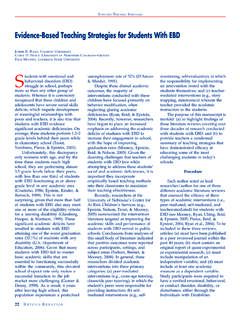Transcription of Clinical Neuropsychology 101 (An Introduction)
1 Module V. Neuropsychological Assessments "The Impact" Module V - Neurological Assessments Page 2 of 22 Instructions to This Module: - If you have questions we encourage you to talk to your supervisor or you can call the ABI Program Manager under (801) 538-8244. Objectives of This Module: a) Understand what a Neuropsychological Assessment is. b) Understand what indicates a Neuropsychological Assessment. c) Understand what Neuropsychological Assessments measure. d) Understand the tests used in Neuropsychological Assessments.
2 E) Understand the purpose of the tests. Module V - Neurological Assessments Page 3 of 22 Clinical Neuropsychology 101 (An Introduction) The Clinical specialty of Neuropsychology bridges interest in the biological function of neural cells in the brain, spinal cord, and body with the study of psychological disorders. The neuropsychologist uses objective, scientific techniques to link behaviors to underlying normal and abnormal biological ( , brain) processes. The Clinical neuropsychologist studies patterns of abnormal behavior to infer the biological abnormalities that might be producing or contributing to those behaviors.
3 Traditionally defined, Neuropsychology is the study of (and the assessment, understanding, and modification of) brain-behavior relationships. Neuropsychology seeks to understand how the brain, through structure and neural networks, produces and controls behavior and mental processes, including emotions, personality, thinking, learning and remembering, problem solving, and consciousness. The field is also concerned with how behavior may influence the brain and related physiological processes, as in the emerging field of psychoneuroimmunology (the study that seeks to understand the complex interactions between brain and immune systems, and the implications for physical health).
4 Neuropsychology seeks to gain knowledge about brain and behavior relationships through the study of both healthy and damaged brain systems. It seeks to identify the underlying biological causes of behaviors, from creative genius to mental illness, that account for intellectual processes and personality. Clinical Neuropsychology seeks such understanding, particularly in the case of how damaged or diseased brain structures alter behaviors and interfere with mental and cognitive functions. The neuropsychologist uses objective tools--neuropsychological tests--to tie the biological and behavioral aspects together.
5 Through the use of tests, the Clinical neuropsychologist is able to differentiate whether or not a behavioral abnormality is more likely caused by a biological abnormality in the brain or by an emotional or learned process. If we presume that the brain is the starting point for why and how we process all mental information (not just cognitive, but interpersonal communications, self-concept, emotional reactivity, personality, learned responses, etc.), then in some aspect, all psychology is Neuropsychology . Neurolinguistics, for example, is the study of how language shapes our self-concepts and our interpersonal communications.
6 Neurodevelopmental psychology is the study of how behavioral and mental characteristics change with nervous system growth. Even psychological concepts of dreaming (and dream content), level of attention, and conscious experience are subserved by brain processes. Neuropsychology is a structured, objective, and scientific discipline for peeking into individual brains by way of formally observing behaviors. Clinical Neuropsychology seeks, ultimately, to understand the individual mind and brain (and its normal as well as errant behaviors). The discipline uses experimental and objective procedures to Module V - Neurological Assessments Page 4 of 22 compare performance among persons with known differences in their biological brain structures (within the limited criteria currently available for defining these differences), and to search for the myriad sources of brain variance that produce individual differences in behavior.
7 These sources include biological factors ( , genetic, diseases, and injuries) as well as psychological factors ( , learned behaviors and personality) and social factors ( , economics, family structure, and cultural values). In the application of Clinical Neuropsychology , understanding the biological sources of individual differences, particularly, helps identify brain-based disorders in memory, personality, self-awareness (conscious experience), cognition, and emotional expression. Working backwards, then, from a look at abnormal behavior obtained using formal tests, reasonable inferences about brain disorders can be reached.
8 Understanding these neurofunctional changes ( , abnormalities) as a result of brain changes ( , injury) defines parameters for current and future behavioral expectations in the lifestyle of the individual. Combined with additional understanding of biopsychosocial factors that coalesce into behavioral expression, the neuropsychologist can gain a comprehensive impression of what is normal or abnormal behavior. As our knowledge of recovery from brain injury improves, such understanding provides realistic expectations for remediation (restoration or adjustment) of disordered behavior.
9 Neuropsychological understanding is achieved through a comprehensive exploration of the neurophysiological foundation of behavior and seemingly infinite potential contributing factors. Everyone s brain is wired differently, a product of native biological structure, past experiences, physical health, learned responses and personality, injuries and diseases, and a host of other factors. Clinically, it is the role of the neuropsychologist to sort out the factors that influence how the brain is working in order to understand disease expression, progress, and recovery. Capsule Description of the Clinical Neuropsychological Assessment Clinical Neuropsychology is.
10 The study of how functional skills ( , memory, language, attention, reading, planning, visual-spatial analysis, problem-solving, and so forth) change and impact daily life as a result of brain dysfunction from injury and disease; the study of the interrelatedness of mental processes and how injury to one brain system may adversely influence the functioning of other, non-injured brain systems; the determination of brain diagnosis based, in part, on results of objective psychological tests sensitive to brain injury or disease, compared with normative performance of non-injured individuals on the same tests; the analysis of life-consequences of brain injury or disease and the processes by which people may recover from dysfunction and/or adapt to disabilities caused by permanent dysfunction.






